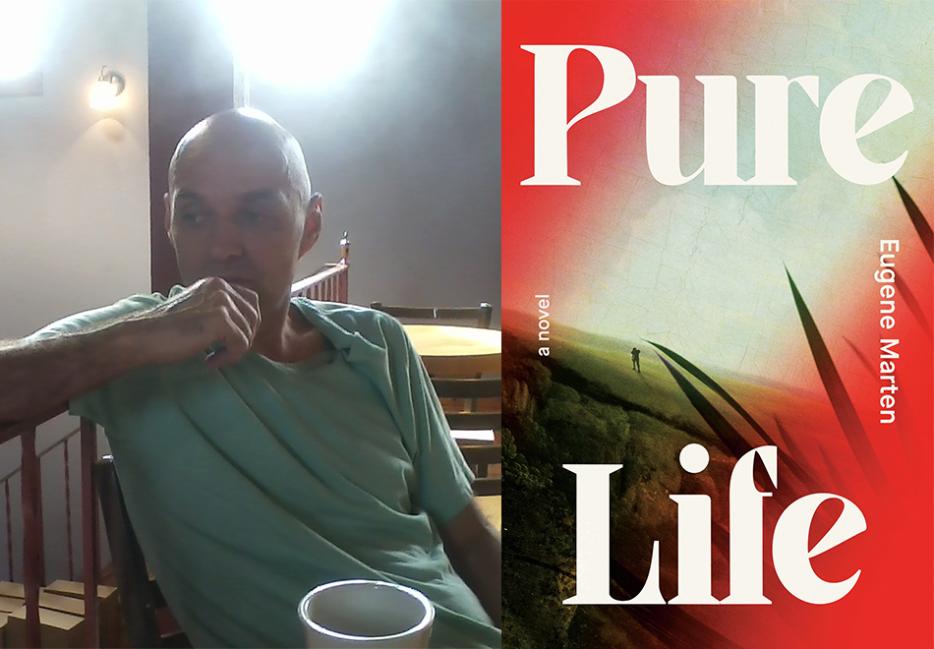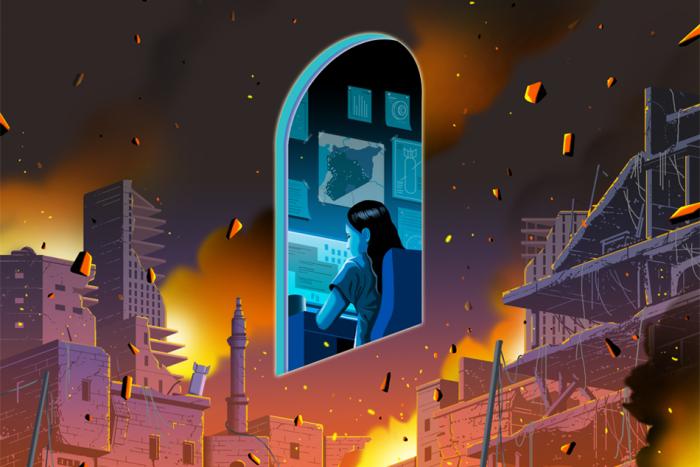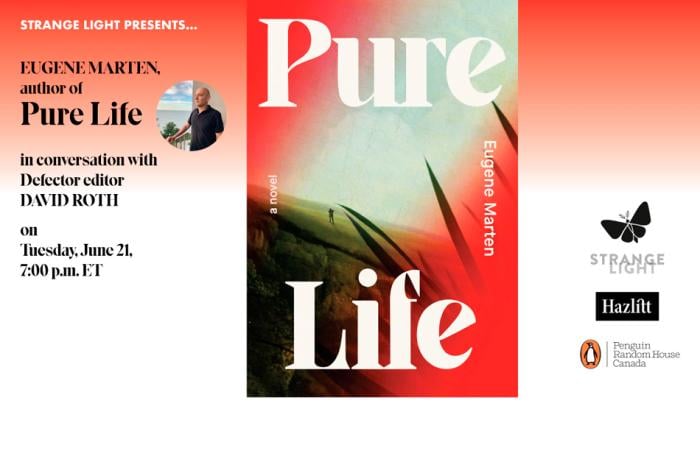At first glance, Eugene Marten’s fifth novel Pure Life (Strange Light) might sound like a departure from the subject material of his previous books, beginning as it does with the archetypal ascent of a small-town high school football player to NFL stardom. Known to the reader only by his jersey number, Nineteen retires early, injured but seemingly destined to slide into what should be a life of fame and fortune and ease. But things go wrong, as the story demands they must. This is in the jacket copy, more or less, so it’s not a spoiler to say all this happens early in the novel: Nineteen’s playing days—and his fortune—are both over and lost before page fifty. What follows is an increasingly nightmarish descent into Nineteen’s brain-damaged psyche, pushed against the brutality of the world he’s leaving behind, in his lost career and family, and the world he enters into as he looks for a miracle cure for what is likely the same chronic traumatic encephalopathy suffered by so many ex-football players. His search eventually leads him to the Mosquito Coast of Honduras, where in his desperation he finds yet another kind of violence, different than that of the playing field or the marketplace but with its own public-facing logic.
Marten’s work possesses a kind of assured restlessness that I’ve always admired: his novels do not commit to remaining in only one mode, or to being about only what they seem to be on the first page. In Pure Life, as in his other books, what for many novelists would be spread over three hundred pages gets compressed into a third of that space, by virtue of a relentless onrush of events, and by Marten’s precision at the level of the sentence and the scene. This compression allows his novels to travel past their initial premise into new territories of aftershock and aftermath, into the deeper wanting that lies behind what a character tells themselves they’ve set out to achieve. His protagonists are flawed and susceptible to temptation, like all of us; they each carry their own personal shard of darkness that, turned the other way around, always catches the light of what else might have been possible. Everywhere his characters go and everything they do is rendered in Marten’s unforgettable prose style, a voice that I’ve long counted among the strongest in contemporary literature.
I spoke to Marten about Pure Life by correspondence throughout the month of May.
Matt Bell: One of the first things a reader is going to notice about Pure Life is your choice not to reveal your protagonist’s name, but to refer to him by his football jersey number, Nineteen. You also don’t name the professional team he plays for, although other players and other teams are named, and you frequently refer to people only by their title or role: Coach, the expatriate, the girlfriend, the Canadian husband, the Canadian wife. I’m curious about the distance this creates between the reader and the characters: is this you purposely holding the reader at a remove, as a novelist, or should we read this more as Nineteen, seeing people not as named individuals but as the roles they play in his life?
Eugene Marten: I would answer yes to the last part of your question, and add that my characters are also referred to by the roles they play in their own lives. This may seem like a distancing device at first, but an initial anonymity to me is a better portal to the world of the book. So many names, even in books I love, sound simply too “made up,” more hiccup than handshake, more narrative convenience than connection. Some writers are better than others at it; you can't argue with Barry Hannah's names, or Joy Williams', and though Hemingway has some real clunkers, opening his best novel with the words “Robert Cohn” is a brilliant stroke. I should say, though, that some of the namelessness in Pure Life is not unqualified; Nineteen is likely unable to retain the Canadian couple's names because of cognitive impairment. I should also say, full disclosure, that the christening of characters is just something I'm not very good at. I'm usually not quite able to overcome that initial feeling of self-conscious artifice, but this is not to say I never use names, I just prefer they be “given” to me, sort of dropped in my lap by necessity, a requirement of the book revealing itself. If I have to look in the White Pages, or play mix and match with firsts and lasts, I'd rather not. Of course, this approach has been used in many short stories, but what happens when it's sustained over the length of a novel (if I'm not mistaken, Matt, you're not entirely a stranger to it)? Book sales notwithstanding, I like to think it doesn't keep the reader at arm's length, but results in a different kind of interaction, maybe one more meaningful than that afforded by the added fiction of a name. One might even imagine one’s own name for a character, just as one imagines how that character might look.
As you said, the act of naming is important to me in my work too: I had a period of several years where I didn’t use a proper name for anyone. There’s a similar estrangement around brand names and the names of locations and other cultural references in Pure Life, which my own work generally shares. In your novel, it’s also a bit selective, coming and going in places. A minor example: there’s an unnamed automobile in the novel that’s clearly a Toyota, which I know only because I own one too, and I recognized the name of its entertainment system, which is named. There are many elements of your work that remind me of DeLillo’s, but one place all your novels feel drastically different to me is in their approach to modernity. If DeLillo simultaneously celebrates it and feels paranoid about it, your novels are doing something else. Is there a general stance in your fiction toward all the markers and signifiers of the branded, commodified world Nineteen and your other characters are moving through?
I think modernity should be given its due, but to me brand names often constitute a kind of verbal death, like finding a bit of plastic in your soup, and I try to use them judiciously. (The sound of the brand, how it interacts with the other sounds, is also a factor.) So I'll use the words around them, suggesting, leading up to, pointing, but leaving the final utterance to the reader—not just so the latter can participate, but to give the object a kind of life, context—roots, if you will. It so often seems that to name something is to discard it before its time—which I suppose could also be the point—but I sometimes prefer to take it just so far and then nod to the reader: We both know what I mean, you take it from here. Now as far as the car you mentioned, it is identified as a Camry in an earlier paragraph, but even if it hadn't been I probably still wouldn't have said “Toyota.” This lends the vehicle the exalted status it has for Nineteen's girlfriend; you have to earn it to say it. On the other hand, the same make is freely mentioned in Honduras, where it has been secondhanded as a common taxi, repurposed along with the old American school buses, NFL jerseys, and other cultural hand-me-downs.
So how's your soup?
“You have to earn it to say it” is such a smart way to say it, and I love how you explain the esteem given to the different brands and objects changing in different contexts. You mentioned that sound is a factor in these decisions: one of the pleasures of reading your work has always been the power of your prose, and certainly that pleasure continues in Pure Life. There are so many places I could choose to quote from, but I’m going to pick a smaller moment because I think it’s the attention given to the small things that really shows a writer’s commitment to getting things right: When Nineteen is on the street in Honduras, he notes offhandedly once that “traffic was dangerous but purposeful; familiar red octagons said ALTO and were regarded as suggestions.” I’ve had a minor obsession with that semicolon there, with its half-stop that in this context feels to me so much like the country road rolling stop you see everywhere in the Midwest where we both grew up. No one would probably notice if a less interesting sentence was in that spot, but I’m glad for the amount of attention you paid even to this scrap of setting.
Assuming it has, how has your approach to your prose itself changed over time? Do you feel compelled to push your sentences in new directions each book, or is it more a matter of trying to deepen and refine your stylistic desires?
I like your take on that semicolon; it never occurred to me but makes beautiful sense. Thank you, Professor Bell. For me, the great joy of writing is working with sentences, finding the voice of the book, its sound. The way to the mind's eye is through the mind's ear. So never describe anything, render it. Don't describe a ship, build a ship out of words. Then go sailing. And study grammar. Two things that writers, including me, are often lousy at: typing and grammar. You can muddle through with the former, but every writer should learn the mechanics of his medium. It's the music theory of literature, and copy editors are a great resource for this. Each book I've attempted has always been a bit more difficult than the one preceding it, so the language will take me somewhere I haven't been. But I think, over time, I'm more and more disposed toward subtlety, refinement, sentences that are objects of integrity themselves without calling attention to it, that don't distract from what they refer to. The sublime can be very quiet. Think of a drummer like Steve Gadd. You hear this song somewhere and he seems to be keeping a simple beat, then you listen and hear these wonderful things he's doing with color and time, then realize you were hearing it all along. I suppose this sounds a bit Aesthetics 101, but for me the quest is for that ideal synthesis of form and content, the wine and its bottle, etc. Maybe form redeems content, resolves it, forgives it, loves it, but anyway, I should probably stop making musical analogies. It's useful to a point, but writing is writing. We're told all the arts aspire to the condition of music, but maybe music seeks to escape its condition.
In 2016, you launched a Kickstarter with the aim of securing funds to travel to Honduras and the Mosquito Coast to research the second half of Pure Life. The Kickstarter ultimately didn’t fund, but I know that those of us who did back it stayed curious about the novel and about the research you’d proposed. Did you end up taking this research trip anyway, or at a later date? Reading the Kickstarter page now, having read the book, it seems like you had a good bit of what would happen in that part of Pure Life planned out: how did the novel change because of this trip, if you did finally go? (Or, if you didn’t, how did it change your plans for the writing?)
I did go on that trip, several months later, and it would have been impossible to finish the book without it. I did have a general sense of where things were going to go once Nineteen made it to Honduras, but the exact logistics were unavailable to me and I couldn’t have just made it up (not to mention the particulars of just being there). I also knew that he was going to get into trouble in the Moskitia but wasn’t sure what kind, and still wasn’t sure when we returned. That part, I had to write my way into.
In that same write-up of your intentions for Pure Life, you noted that “the theme of vocation is central to the book, as it is in all my work.” The only thing Nineteen is particularly successful at is football, although the money he makes playing affords him a temporary future as an entrepreneur and real estate developer. After he loses most of his money, it leaves him with another kind of loss, this time of purpose and usefulness to others. What is it about vocation that animates you, and how does that translate to animating your characters on the page?
In our system you have to work. For the vast majority of us, it's a basic fact of life. I've had a good number of jobs in my time—I'd say fifty or so—mostly blue collar stuff, a lot of it menial, and there was a seemingly endless hand-to-mouth period where my wife and I supported a young family, were on the verge of eviction and what is now called food insecurity more than once, and bounced desperately from gig to minimum wage gig as though it were a matter of life and death, which case could be made. I lived in terror of homelessness. My story is hardly unique, and people have had it much, much worse, but that might explain my writerly obsession with what people “do.” Whether it's a job, or lack of one, vocation or avocation, labor of love or necessary evil, something that defines us or something to transcend, it's always there.
As a novelist, I’m always looking for ways in which the book can be smarter than the protagonist, or have a bigger scope, and I feel what seems to be a similar want in Pure Life, as I did in Layman’s Report. In that novel, I’ve always thought the first chapter admirably widened the playing field of the novel, before we meet Fred; in Pure Life, there are several such times where we step away from Nineteen. The one that’s stuck with me most is when Nineteen is talking with a character in Honduras known to us as the expatriate: Nineteen asks the expatriate how he met his wife, which leads to a four-page paragraph of the wife’s backstory, a tale that “the expatriate didn’t know, though she had tried to tell him,” of the horrors the wife had passed through to get to the time and place where they met. A couple pages later, these memories get referenced again, when Nineteen declines to explain his playing days to the expatriate, pretending not to remember. But then you write, “In truth he remembered nothing as clearly, but he couldn’t convey it to someone who hadn’t played the game, any more than he could have known what it was like to cling to the ice-covered roof of a train roaring through thirty-one tunnels in mountain dark.” It’s such a curious moment, where Nineteen’s consciousness mirrors or perhaps rhymes with that of the expatriate’s wife, a character who never appears in the scene.
This is a longwinded way of asking how you think of the limitations or possibilities of the novel: How big of a playing field have you given yourself here? How did you decide what was permissible and what should be avoided?
The possibilities of the novel are virtually infinite, and for me this is also its limitation. There's such a thing as too much freedom. I distrust omniscience, it seems to me unanchored, loose, lacking in tension; too “easy” in a sense. So my preferred mode to this point is pretty much close third, generally sticking with one character throughout. We see the story unfold over his shoulder, if not through his eyes. The limitations this imposes help me find that voice (Branford Marsalis, on the notion that jazz musicians just get up there and play whatever they want: “There's no freedom in freedom, there's freedom in structure”) and the opportunity it affords to slip seamlessly between interiority and external action is unique to the medium. I also generally eschew multiple POVs for similar reasons. (I think there was a Russian filmmaker who, back in the Potemkin era, repudiated the importance of montage, saying it cut the world up into little pieces. The same might be said for multiple POV. It might be said the world is already cut up into little pieces, that it is in the nature of the novel to impose some coherence, put the puzzle back together.) The passage you mention, involving the expatriate's wife, is sort of an exception, but we hear her story by not hearing it, and, technically, never leave Nineteen's side. Another occurs later, involving multiple characters in an explicit departure at a critical point in the story, but these are elided one to the other without a break, sort of like single-take camerawork in a film, and we ultimately end up back with Nineteen. So it happens, I hope, in the same earned, qualified way I try to approach other aspects of the book, e.g., naming names. (There are also a couple of sections seen through a video camera, ostensibly online, which is the omniscient POV the internet now provides the world, for better or for worse.)
But I think a novel of scope is possible regardless of its POV. (“Call me Ishmael”?) You just have to figure it out. I should also say that the book I'm planning now may contradict everything I said above.
In the second half of Pure Life, Nineteen goes through a brutal kind of hell, a series of trials in which he is in some ways a bit character: the people acting upon him don’t seem to care that much that the person they’re doing things to is him, the famous football player. This made me think of Stanley Elkin, who once said he “would never write about someone who was not at the end of his rope,” and that “all books are the Book of Job, high moral tests and tasks set in fairy tales, encoded as clues from the sibyls, all their tricky, forked-tongue talk, land-mined and unforgiving as golf greens, as steeplechase and game board and obstacle course.” Nineteen arrives at his own high-stakes, winner-take-all test in the Mosquito Coast deeply diminished in both body and mind, years past his prime in so many ways. Is there a particular interest in your approach to fiction in what happens to a person once they’ve overshot their success, or come down the other side of it? (Something like that happens in Layman’s Report too, I think.) All of your novels, in one way or another, include passages through various kinds of brutality, experiences for which your characters are not always ready.
I'm glad you noticed Nineteen is at times reduced to a kind of bit player in his own ordeal/drama, a taste of the “normalcy” he craves, or at least thinks he does. That was my intention. Even his abductors, rather than simply parlaying his diminished celebrity to some advantage, take ironic pains to remind him he was, ultimately, an also-ran. AKA a human being. We expect him to step up, take charge, “redeem” himself, but for the most part the heroics we get are reminders of past glory. That Elkin quote fits him quite well (and might describe my writing career). I've always been drawn to people/characters in extremis; it's simply what generates narrative language for me. That it increasingly evokes twilight, the auroras of autumn, the sinking of the soul's vessel, etc., may be due in part to the moment I find myself approaching now, but also because we seem at times to be facing our own Götterdämmerung, as a society, as a species, or at least turning a very scary corner. So the writer calmly, dispassionately, asks of the page the proverbial question: What happens next? (Might as well make great music out of it. How's that for redemption?) All this said, I don't consider myself a pessimist. It sounds pat but I may dwell in darkness to affirm its opposite. There's a scene in Firework where the protagonist is enduring a performance of avant garde music which he obviously feels is a bunch of noise to be escaped from, yet I tried to write the section in such a way that the beauty/interest of the music would shine through both because and in spite of his reaction. Not the first time I've tried that, I think, and probably not the last. My favorite season might be autumn, but spring isn't bad either.






